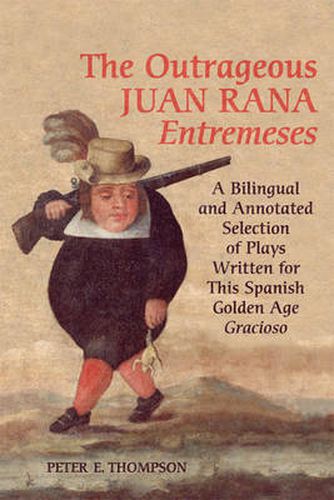Readings Newsletter
Become a Readings Member to make your shopping experience even easier.
Sign in or sign up for free!
You’re not far away from qualifying for FREE standard shipping within Australia
You’ve qualified for FREE standard shipping within Australia
The cart is loading…






Juan Rana, the most famous actor of the Spanish Golden Age, enjoyed a long and successful career from 1617 to 1672. Over fifty entremeses - interludes featured between the main acts of full-length plays - were written especially for him by some of the most important playwrights of the period. This bilingual and annotated edition of The Outrageous Juan Rana Entremeses translates a selection of the entremeses for the first time, highlighting their literary complexity and providing historical context for the many double meanings and innuendos they contain.
Rana’s arrest for homosexuality in 1636 led him to play more gender bending, transvestite, and implicitly sexual roles. Many of his roles parody marriage, patriarchy, and heterocentric values while wrestling with issues of gender, sexual, and biological identity. As Peter E. Thompson ably demonstrates, these interludes challenge preconceived notions about society during the Spanish Golden Age by dealing with subject matter that remains extraordinarily relevant today.
$9.00 standard shipping within Australia
FREE standard shipping within Australia for orders over $100.00
Express & International shipping calculated at checkout
Juan Rana, the most famous actor of the Spanish Golden Age, enjoyed a long and successful career from 1617 to 1672. Over fifty entremeses - interludes featured between the main acts of full-length plays - were written especially for him by some of the most important playwrights of the period. This bilingual and annotated edition of The Outrageous Juan Rana Entremeses translates a selection of the entremeses for the first time, highlighting their literary complexity and providing historical context for the many double meanings and innuendos they contain.
Rana’s arrest for homosexuality in 1636 led him to play more gender bending, transvestite, and implicitly sexual roles. Many of his roles parody marriage, patriarchy, and heterocentric values while wrestling with issues of gender, sexual, and biological identity. As Peter E. Thompson ably demonstrates, these interludes challenge preconceived notions about society during the Spanish Golden Age by dealing with subject matter that remains extraordinarily relevant today.